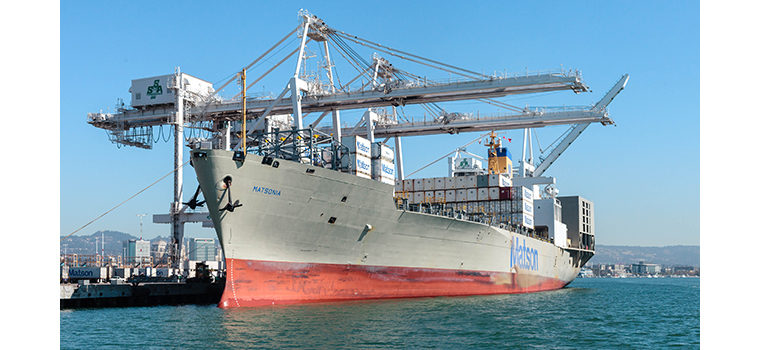In a move signaling long-term confidence in the Port of Oakland's strategic plan, SSA Terminals has signed an agreement to maintain its operations there well past the current lease expiring in 2027.

SSA, the largest maritime operator in the Port of Oakland, recently signed a new agreement that could keep the company there until 2042. Photo courtesy of the Port of Oakland
BY PATRICK BURNSON
Published: July, 2018
In a move signaling long-term confidence in the Port of Oakland’s strategic plan, SSA Terminals has signed an agreement to maintain its operations there well past the current lease expiring in 2027.
Indeed, according to the port, the deal includes options that could keep the global terminal operator there until 2042. “SSA is an influential player on the waterfront worldwide, and a significant presence in Oakland,” said Port of Oakland Maritime Director John Driscoll.
Key elements of the deal include a 19-acre expansion at SSA’s Oakland International Container Terminal (OICT); the purchase of three new ship-to-shore cranes by the terminal operator for cargo handling; and options that would extend the new lease an additional 15 years if certain conditions are met.
SSA is the largest marine terminal operator in Oakland. OICT, the nation’s second-busiest marine terminal, handles about 60 percent of the port’s total containerized cargo volume. SSA also operates Oakland’s Matson Terminal, which is included in the new lease.
Three operating companies, including SSA, lease terminal facilities from the Port of Oakland. Terminals are the focal point of seaport operations and are where ships, trucks and trains converge to move containerized cargo. SSA has operations at 250 locations on five continents.
“We see steady cargo growth for Oakland into the next decade,” said Ed DeNike, president of SSA Containers. “This new lease helps us plan for the future.”
SSA earned recognition over the last three years for leading an operational transformation in Oakland. It was the first operator to open gates at night for cargo pickup or delivery. It’s also currently raising the height of four cranes to better handle a new class of megaships in Oakland.
The port has yet to attract a major ocean carrier on an “first call” basis, but it is ensuring that when that happens it will be mega-ship ready. “There’s ample room to grow at the Port of Oakland,” said the port’s communication’s director, Mike Zampa.
“The important thing is that SSA, and our other terminal operators, are continually improving operations. That means they can absorb additional volume without disrupting supply chains.”
The new lease binds SSA to a list of environmental commitments in Oakland, including compliance with state and federal laws and the port’s Maritime Air Quality Improvement Program. Under the agreement, the terminal operator will apply for government grants to reduce emissions from cargo handling equipment.
Lytle Urges Global Mindset in Commencement Address
Speaking at Central Washington University’s commencement last month in Kent, Wash., Port of Oakland Executive Director Chris Lytle asked his audience to embrace globalization. At the same time, he urged college graduates to reject “extreme protectionism,” calling it damaging and futile.
“Don’t disengage from the world—don’t be part of the illogical rush to draw the drapes and turn out the lights,” the longtime international maritime leader told an audience of 5,000. “We see too much of it today in Britain, Italy, France and right here in the U.S.”
As a Central Washington graduate in the class of 1979 who has run two of the nation’s largest ports (Oakland and Long Beach), Lytle had practical advice for graduates: “Don’t shy away from hard work and show up on time.” But he saved his most forceful comments for a looming U.S.-China trade war. Both nations have introduced tariffs that threaten to disrupt international commerce.
Shortly before the Trump administration announced massive new punitive tariffs against China and Canada, Lytle warned that the moves could undermine free trade. “And free trade has been the backbone of worldwide economic growth,” he said.
Lytle called tariffs the latest example of misguided nationalism. He said they run contrary to the advance of globalization and trade liberalization. “Globalization is the story of the 21st century,” Lytle said. “It has produced an era of unprecedented, worldwide economic growth.”
Lytle said a Chinese trade war would economically damage Washington as well as his home state of California. Both states produce farm goods targeted by Beijing’s retaliatory tariff regime, he pointed out. Those products, ranging from fruit to nuts, are exported through the ports of Oakland, Seattle and Tacoma.
“What’s going to happen to those commodities with higher tariffs?” Lytle asked. “Prices will go up. Demand will go down. And China’s booming market for American exports will wither.”
Lytle predicted that a trade war with China would result in lost jobs and lost income. He also warned of lost opportunities for graduates.
Lytle urged graduates to explore opportunities worldwide as they embark on careers. He asked them to help combat the spread of protectionist measures that could jeopardize their future. “Free trade and the world economy are what you grew up with,” Lytle said. “They’re what you know, and they’re what’s right for a world struggling to come together—not pull apart.”
Patrick Burnson is the executive editor of Logistics Management. www.logisticsmgmt.com

